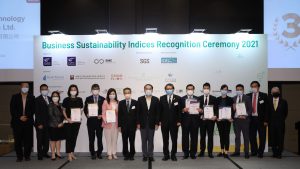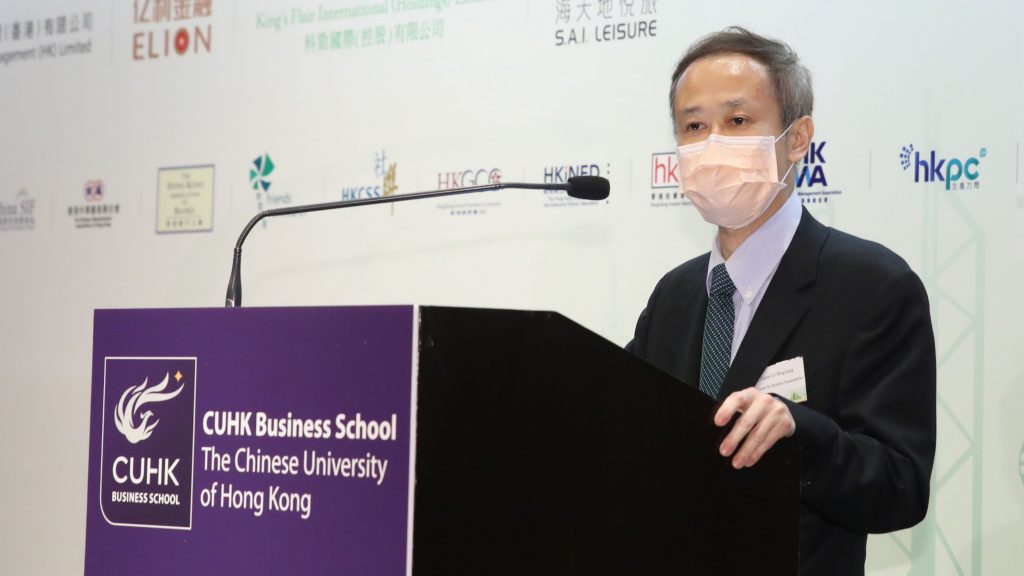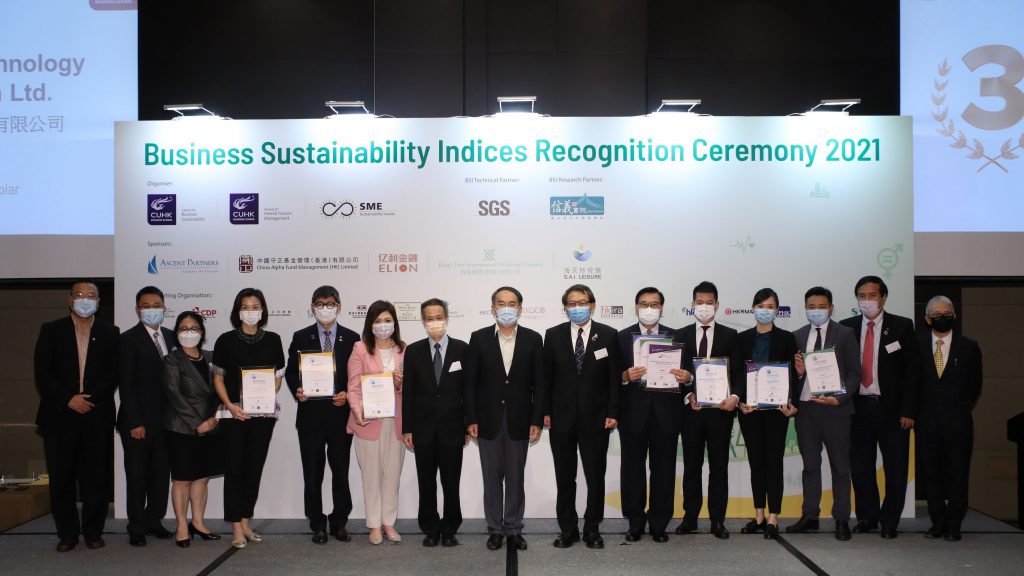CUHK
News Centre
CUHK Business School Announces Five Business Sustainability Indices to Promote Responsible Business Practices in Hong Kong and Greater China
The Chinese University of Hong Kong (CUHK) Business School’s Centre for Business Sustainability (CBS) announces today results of the 6th Hong Kong Business Sustainability Index (HKBSI), the 2nd Greater Bay Area Business Sustainability Index (GBABSI) and the 6th Hong Kong SME Business Sustainability Index (HKSMEBSI), as well as launches the 1st Greater China Business Sustainability Index (GCBSI) and the 1st Greater China Hotel Business Sustainability Index (Hotel BSI).
The unique “Values – Process – Impact” (VPI) model, which was developed and launched in 2015 by CBS, is used in the assessment of all the five Business Sustainability Indices (BSI). Each index company was assessed in three major areas, namely Corporate Social Responsibility (CSR) Values, CSR Process (comprising CSR Management and Practice) and CSR Impact against seven stakeholder groups (Community, Consumer, Employee, Environment, Government, Investor and Supplier), as well as the company’s contributions to economic, social and environmental sustainability. As the Technical Partner of the projects, SGS Hong Kong Limited conducted sample check and verification of the information provided by individual companies. The Sinyi School of NCCU College of Commerce in Taiwan also helped compile the data of Taiwan companies in the GCBSI.
The 6th HKBSI
HKBSI is aimed at charting the ongoing development and performance of Hang Seng Index constituent companies on business sustainability. Compared to the results of the 5th HKBSI released last August, the overall average score of the 50 Hang Seng Index (HSI) constituent companies as at 31 July 2020 was 58.66 (out of 100 points), up by 1.95 percent.
Within the VPI model, the average score of “Values” and “Process-Practice” remained stable compared with that of the 5th HKBSI, while “Process-Management” improved slightly with a 7.33 percent rise but “Impact” dropped by 2.43 percent. In terms of stakeholder analysis, companies showed improvement in Practices such as Employee (5.14 percent rise), Government (up by 2.75 percent), Investor (3.44 percent increase) and Supplier (4.03 percent rise).
Currently, more than half (52 percent) of HSI constituent companies are non-Hong Kong based companies, comprising of H-shares, red chips and other mainland Chinese firms listed in Hong Kong. The overall average score of these non-Hong Kong based companies in the 6th HKBSI recorded a 2.89 percent rise to 50.96 (out of 100 points) when compared to a rise of just 1.18 percent to 67 points for Hong Kong based companies, showing that non-Hong Kong based companies exhibited a bigger performance improvement in business sustainability, especially in CSR management, which was up by 9.39 percent.
Prof. Carlos Lo, Director of CBS, explained, “A salient trend can be observed in the stakeholder analysis is a significant increase of the CSR practices over three out of the four value chain stakeholder groups, namely, Employee (up 5.14 percent), Supplier (up 4.03 percent) and Investor (up 3.14 percent) in comparing with the results in the last round. Still Customer records a slightly increase of 0.45 percent. This indicates the positive development of continuous integration of CSR into corporate core business.”
The 2nd GBABSI
CBS extended its sustainability index project to cover Hong Kong listed companies with operations in Guangdong-Hong Kong-Macao Greater Bay Area that are eligible for southbound trading under the Stock Connect scheme last year. A total of 66 constituent companies of the Hang Seng Stock Connect Hong Kong Greater Bay Area Index as at 31 July 2020 were invited to complete an online assessment questionnaire for the 2nd GBABSI with the same scope as HKBSI.
Benchmarking against the 6th HKBSI results (58.66 points), the overall average score (52.86 points) of the GBABSI companies was still lower, but the performance gap was narrowing with a significant improvement in all the four aspects (Values, Process-Management, Process-Practice and Impact) from 10.70 percent, 12.80 percent, 15.80 percent to 26.27 percent respectively.
GCBSI – the First-of-its-Kind Sustainability Performance Measurement for Listed Companies in Greater China
To encourage and motivate companies in the Greater China region to integrate CSR initiatives into everyday business, CBS rolls out the GCBSI to cover 200 listed companies from HSI, FTSE TWSE Taiwan 50 Index, Shenzhen 100 Index and Shanghai Stock Exchange SSE 50 A Share Index.
In the inaugural GCBSI, the overall average score is 43.11 with an extremely high standard deviation. Specifically, listed companies from Taiwan outperformed those from Hong Kong and mainland China with an average score of 66.05, which is followed by listed companies in Hong Kong (58.66 points), Shanghai (36.56 points) and Shenzhen (26.73 points). Six out of the Top 10 in the 1st GCBSI were Hong Kong companies, and half of the Top 20 companies were from Taiwan. The Hong Kong and China Gas Company Limited and BOC Hong Kong (Holdings) Limited held the top and the second spots, respectively, in the GCBSI, GBABSI and HKBSI. In terms of stakeholder analysis, Taiwan companies maintained a balanced performance in all the seven stakeholder practices, while Shanghai and Shenzhen companies put a relatively stronger emphasis on government and investor.
“These results provide strong evidence to show the comparable standard between companies listed in Hong Kong and Taiwan in performing CSR for achieving sustainability among the Top 20 performers, while those listed in Shanghai and Shenzhen are on the whole in the catching up stage. There is a lot for Mainland-listed companies to learn from their Hong Kong and Taiwan counterparts in sustainability management,” explained Prof. Lo.
Hotel BSI – the First Business Sustainability Index for Listed Hotel Companies in Greater China
In a collaboration with Centre for Hospitality and Real Estate Research (CHRER) at CUHK Business School’s School of Hotel and Tourism Management, results of the inaugural Hotel BSI were also announced today, showing that leading international hotel chains and companies listed in Greater China are showing increasing concern for CSR and business sustainability.
The 1st Hotel BSI shows the annual business sustainability performance for the financial year ended in 2019-20, based on publicly available information of the 30 listed hotel companies in Greater China and six large international hotel chains. It aims at engaging hotel companies in continuous optimisation of CSR hotel practices, and thereby achieve sustainable development and concurrent growth to the benefit of both businesses and society.
Half of the hotel companies achieved over 50 points and reached the “Performer” level, which is comparable to internationally recognised standards of excellence in CSR. Currently, 61 percent of the Hotel BSI constituent companies are Hong Kong and Macau based companies or one of six international hotel chains, and 22 percent are Taiwan based and 17 percent are mainland China based. The Top 10 performers were mostly international hotel chains or Hong Kong listed companies, and only one non-Hong Kong based company entered the Top 10.
The 6th HKSMEBSI
Compiled and announced biannually since 2015, HKSMEBSI aims at inspiring small and medium enterprises (SMEs) in Hong Kong to adopt CSR as a management model to enable them to achieve business sustainability. A total of 27 SMEs with proven track records in CSR performance, namely, winners of major CSR related awards, were invited to complete an assessment questionnaire pertaining to their CSR performance for the preceding two years. For the 6th HKSMEBSI, the assessment was based on the 2020 data provided by the companies.
The overall average score of the index companies in the 6th HKSMEBSI is 78.73 (out of 100 points), a slight improvement compared with that of the 5th HKSMEBSI announced in 2019. Among the seven stakeholder practices, in comparison with the results of the 5th HKSMEBSI, community, customer and government saw improvement. Unlike the listed companies evaluated in the 6th HKBSI, the scores in Investor and Supplier practices decreased by 16.94 percent and 15.22 percent respectively.
Prof. Lo said, “It is very encouraging to see SMEs sustaining their high level of CSR performance, despite the difficult year of 2020, particularly in the delivery of their CSR initiatives. The stakeholder analysis has indicated that Customer remains the most important stakeholder group in the value chain than Investor and Supplier that received the greatest SMEs’ sustainability management attention. It is understandable that business survival is the top priority for SMEs of. At the same time, it is pleased to see their continuous and active pursuit of community engagement.”
The Inaugural Hotel BSI lays a good foundation for the compilation of a Global Hotel BSI. In 2022, CBS will continue to work with CHRER to introduce a BSI covering 80 listed hotel companies worldwide. This can not only encourage companies in the hotel industry to adopt CSR as a progressive business model to achieve business sustainability, but also serve as a robust indicator for ESG investors in selecting companies with socially responsible corporate behaviour. Furthermore, CBS will work closely with the Asia-Pacific Institute of Business, the executive education arm of CUHK Business School, on designing more training programmes and workshops on CSR applications and communication for the business community. Understand that business sustainability is an unended quest that requires companies to build management capacity on a continuous basis, CBS has set its future endeavour on cultivating sustainability talents by developing sustainability management into a knowledge-based profession. This includes the formulation of a qualification framework for the sustainability profession, the support of setting up of a sustainability professional association, and the organisation of sustainability management programme.
Please visit https://bit.ly/3j4CT7E to read the press release on the CUHK Business School website.
About CUHK Business School
CUHK Business School comprises two schools – Accountancy and Hotel and Tourism Management – and four departments – Decision Sciences and Managerial Economics, Finance, Management and Marketing. Established in Hong Kong in 1963, it is the first business school to offer BBA, MBA and Executive MBA programmes in the region. Today, CUHK Business School offers 10 undergraduate programmes and 18 graduate programmes including MBA, EMBA, Master, MSc, MPhil and Ph.D. The School currently has more than 4,600 undergraduate and postgraduate students from 20+ countries/regions.
In the Financial Times Executive MBA ranking 2020, CUHK EMBA is ranked 15th in the world. In FT‘s 2021 Global MBA Ranking, CUHK MBA is ranked 48th. CUHK Business School has the largest number of business alumni (40,000+) among universities/business schools in Hong Kong – many of whom are key business leaders.
More information is available at www.bschool.cuhk.edu.hk or by connecting with CUHK Business School on:
Facebook: www.facebook.com/cuhkbschool
Instagram: www.instagram.com/cuhkbusinessschool
LinkedIn: www.linkedin.com/school/cuhkbusinessschool
WeChat: CUHKBusinessSchool
About CUHK CBS
The Centre for Business Sustainability (CBS) is a collaboration between the Department of Management and the Department of Government and Public Administration at CUHK. Founded in June 2018, the CBS mission is to promote business sustainability as a viable and profitable business model through conducting innovative research on Corporate Social Responsibility (CSR) and sustainability management practices in the region. CBS also aims to transfer the acquired knowledge of CSR applications to both academic and business communities. The centre’s projects include Business Sustainability Indexes on listed companies and SMEs, local companies and corporations based in the Greater China Region.
For media enquiries, please contact:
Edmond Siu
Senior Public Relations and Communications Manager
Tel: +852 3943 1842
Email: edmondsiu@cuhk.edu.hk
Prof. Carlos Lo
Director, Centre for Business Sustainability
Tel: +852 3943 7486
Email: carlos.lo@cuhk.edu.hk

Mr. Christopher Hui Ching-yu, JP, Secretary for Financial Services and the Treasury of the Hong Kong Government (middle); Prof. Rocky Tuan, Vice-Chancellor and President of CUHK (7th from the right); and Prof. Lin Zhou, Dean of CUHK Business School (2nd from the right), presented recognition certificates to representatives from the Top 10 companies of the five business sustainability indices.






